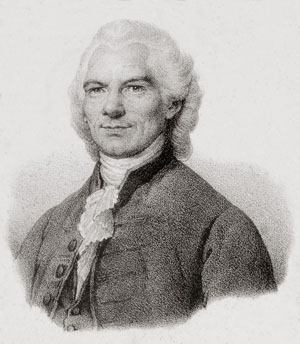<Back to Index>
- Mathematician Hermann Minkowski, 1864
- Poet Jacques Delille, 1738
- Royal Navy Captain George Vancouver, 1757
PAGE SPONSOR


Jacques Delille (June 22, 1738 – May 1, 1813) was a French poet and translator. He was born at Aigueperse in Auvergne.
He was an illegitimate child, and was descended by his mother from the chancellor De l'Hôpital. He was educated at the College of Lisieux in Paris and became an elementary teacher. He gradually acquired a reputation as a poet by his epistles, in which things are not called by their ordinary names but are hinted at by elaborate paraphrases. Sugar becomes le miel américain, Que du suc des roseaux exprima l'Africain.
The publication (1769) of his translation of the Georgics of Virgil made him famous. Voltaire recommended the poet for the next vacant place in the Académie française. He was at once elected a member, but was not admitted until 1774 owing to the opposition of the king, who alleged that he was too young. In his Jardins, ou l'art d'embellir les paysages (1782) he made good his pretensions as an original poet. In 1786 he made a journey to Constantinople in the train of the ambassador M. de Choiseul-Gouffier.
Delille had become professor of Latin poetry at the Collège de France, and abbot of Saint-Sévrin, when the outbreak of the French Revolution reduced him to poverty. He purchased his personal safety by professing his adherence to revolutionary doctrine, but eventually quit Paris, and retired to Saint-Dié-des-Vosges, where he completed his translation of the Aeneid.
He emigrated first to Basel and then to Glairesse in Switzerland. Here he finished his Homme des champs, and his poem on the Trois règnes de la nature. His next place of refuge was in Germany, where he composed his La Pitié; and finally, he passed some time in London, chiefly employed in translating Paradise Lost. In 1802 he was able to return to Paris, where, although nearly blind, he resumed his professorship and his chair at the Académie française, but lived in retirement. He fortunately did not outlive the vogue of the descriptive poems which were his special province.